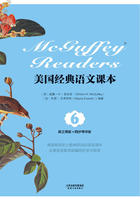
LESSON 32
PITT'S REPLY TO SIR ROBERT WALPOLE
William Pitt, 1708-1778, one of the ablest statesmen and orators of his time, was born in Cornwall, and educated at Eton and Oxford. He entered Parliament in 1735, and became a formidable opponent of the ministry of Sir Robert Walpole. He gained great reputation by his wise and vigorous management of military affairs in the last years of the reign of George II. He opposed the “Stamp Act” with great earnestness, as well as the course of the ministry in the early years of the American Revolution. In 1778, he rose from a sick bed to make his celebrated speech, in the House of Lords, in opposition to a motion to acknowledge the independence of America. At its close, he fell in an apoplectic fit, and was borne home to die in a few weeks afterward. He was buried in Westminster Abbey. Mr. Pitt possessed a fine personal presence and a powerful voice; he was very popular with the people, and is often called the “Great Commoner.” He was created “Earl of Chatham” in 1766.
The atrocious crime of being a young man, which the honorable gentleman has, with such spirit and decency, charged upon me, I shall neither attempt to palliate nor deny; but content myself with hoping that I may be one of those whose follies cease with their youth, and not of that number who are ignorant in spite of experience. Whether youth can be imputed to a man as a reproach, I will not assume the province of determining; but surely age may become justly contemptible, if the opportunities which it brings have passed away without improvement, and vice appears to prevail when the passions have subsided. The wretch, who, after having seen the consequences of a thousand errors, continues still to blunder, and whose age has only added obstinacy to stupidity, is surely the object either of abhorrence or contempt, and deserves not that his gray hairs should secure him from insult. Much more is he to be abhorred, who, as he has advanced in age, has receded from virtue, and become more wicked—with less temptation; who prostitutes himself for money which he can not enjoy, and spends the remains of his life in the ruin of his country.
But youth is not my only crime; I am accused of acting a theatrical part. A theatrical part may either imply some peculiarity of gesture, or a dissimulation of my real sentiments, and an adoption of the opinions and language of another man. In the first sense, the charge is too trifling to be confuted, and deserves only to be mentioned that it may be despised. I am at liberty, like every other man, to use my own language; and though, perhaps, I may have some ambition to please this gentleman, I shall not lay myself under any restraint, nor very solicitously copy his diction or his mien, however matured by age, or modeled by experience.
But, if any man shall, by charging me with theatrical behavior, imply that I utter any sentiments but my own, I shall treat him as a calumniator and a villain; nor shall any protection shelter him from the treatment he deserves. I shall, on such an occasion, without scruple, trample upon all those forms with which wealth and dignity intrench themselves, nor shall anything but age restrain my resentment; age, —which always brings one privilege, that of being insolent and supercilious, without punishment.
But, with regard to those whom I have offended, I am of opinion that, if I had acted a borrowed part, I should have avoided their censure: the heat that offended them was the ardor of conviction, and that zeal for the service of my country which neither hope nor fear shall influence me to suppress. I will not sit unconcerned while my liberty is invaded, nor look in silence upon public robbery. I will exert my endeavors, at whatever hazard, to repel the aggressor, and drag the thief to justice, whoever may protect him in his villainies, and whoever may partake of his plunder.
 STUDY GUIDE
STUDY GUIDE
A. Vocabulary Power—Answer the following questions related to the vocabulary in Pitt's reply.
1. An atrocious crime is something terrible that someone does such as kill another person. Is “... being a young man” an atrocious crime? Explain.
2. Folly is foolishness or lack of good sense. What is Mr. Pitt's folly?
3. Ignorant means stupid. Why does Mr. Pitt say that it is worse to be “... ignorant in spite of experience” than to have folly?
4. To be wicked is to be mean to other people. Was Mr. Walpole wicked to Mr. Pitt? Explain.
5. Liberty is freedom. Is liberty important to Mr. Pitt? Explain.
B. Opinion questions—With a partner, give your opinion about the following questions.
1. What is the mood of Mr. Pitt's reply to Mr. Walpole—angry, sad, or happy? Explain.
2. In the second paragraph, Mr. Pitt says: “I am at liberty, like every man, to use my own language”. Do you agree with him? Explain.
3. How do you think Mr. Walpole would feel after reading Mr. Pitt's reply? Why?
4. At the end of his reply, Mr. Pitt says he will continue to use a lot of zeal when he speaks. Why does he say this?
5. Justice refers to doing the right thing. Do you think justice is important to Mr. Pitt? Explain.
C. Opposites—Find words in Pitt's reply that have the same or similar meaning to words in this exercise.
1. paragraph 1—old age: y ____
2. paragraph 1—friendly: w _____
3. paragraph 2—fake: r ___
4. paragraph 3—saint: v ______
5. paragraph 3—poverty: w _____
6. paragraph 4—fact: o ______
7. paragraph 4—private: p _____